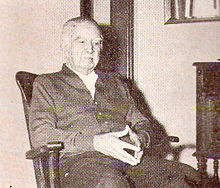Nimio de Anquín
| Nimio de Anquín | |
|---|---|
 |
|
| Born |
Nimio de Anquín 1896 Córdoba, Argentina |
| Died | 1979 |
| Nationality | Argentine |
| Alma mater | National University of Córdoba |
| Occupation | Lecturer |
| Known for | Politician |
| Political party | National Fascist Union |
Nimio de Anquín (1896 — 1979) was an Argentine Thomist writer and fascist politician. Seeking to combine European models of fascism with his own attachment to the Catholic Church he led several movements and for a time had a strong following. Subsequently, however, he lost political influence and his later life was mainly focused on his academic career.
A native of Córdoba, Argentina, de Anquín studied law at National University of Córdoba. With his studies in Argentina completed he travelled to Germany to study philosophy under Ernst Cassirer. Whilst in Europe he developed his interest in politics and became a follower of the ideas of Charles Maurras after coming into contact with his work. Soon de Anquín sought to develop his own political ideas by seeking to combine Thomism with Hegelianism, leading him to call for a national syndicalist state.
He was a founder of the Instituto San Tomas de Aquino in Córdoba, Argentina in 1929 and this group would become linked to the Argentine Fascist Party. In 1934 he joined the Fascismo Argentino de Córdoba (Blueshirts). By the following year he had taken over as leader of the group, which by then had changed its name to the Frente de Fuerzas Fascistas in 1935. Various groups then merged in 1936 to emerge as the Union National Fascista under de Anquin's leadership. A strong admirer of Benito Mussolini and Italian fascism, he argued that Argentine nacionalismo should follow the Italian model by seeking to mobilise mass support but that the domestic version of fascism should put a stronger emphasis on the centrality of Catholicism to national identity than its European counterparts.
However de Anquín found it difficult to lead the fascist movement in the face of opposition. In 1934 he was suspended from his lectureship at the Colegio Nacional de Monserrat, in Córdoba, due to the violence of his movement. The violence continued however until active repression began in late 1936 when he attempted to force university students to sign a letter in support of Francisco Franco. By 1939 the Union National Fascista was effectively moribund.
...
Wikipedia
